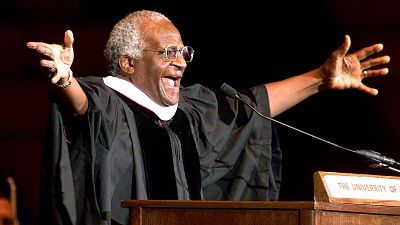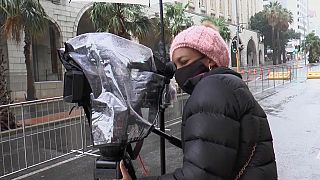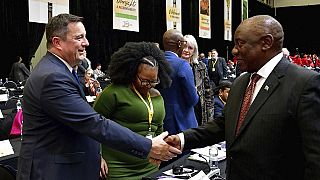South Africa
“Do your little bit of good where you are; it's those little bits of good put together that overwhelm the world. “
“Forgiveness says you are given another chance to make a new beginning. “
“I can't for the life of me imagine that God would say, I punish you because you are homosexual; you ought to have been heterosexual. I can't, I can't for the life of me believe that that is how God sees things.”
Yes, he is no more, but for words like these, which he uttered, the illustrious son of Matlosana, South Africa, Archbishop Emeritus Desmond Tutu will forever be remembered.
His death is still a shock to many not only in South Africa but also across the world as tributes from world leaders keep pouring in since his family announced his death on December 26, 2021.
South African president Cyril Ramaphosa, President Biden, British Prime Minister Boris Johnson, Queen Elizabeth II, former American president Barack Obama and Australian Prime Minister Scott Morrison are few of the world leaders who have showered messages of condolence on the anti apartheid icon.
Secretary-General António Guterres was among UN leaders paying tribute on Sunday to the late Archbishop Desmond Tutu, describing him as “an unwavering voice for the voiceless.”
President Joe Biden also reported to be 'heartbroken' over the death of the Archbishop. A statement by the Biden family reads: '…we are heartbroken to learn of the passing of a true servant of God and of the people, Archbishop Desmond Tutu of South Africa.'
'His courage and moral clarity helped inspire our commitment to change American policy toward the repressive Apartheid regime in South Africa.'
As the world keeps mourning the man whom many described as a **'moral compass', ** one significant observation has been the purple light illumination at Cape Town’s city hall and the Table Mountain, which rises above the city.
Series of other purple themed events have been held in honour of the late anti apartheid foe and stalwart of the liberation struggle. A typical example of such events was the interfaith musical memorial at Cape Town city hall on Wednesday December 29 which attracted many including politicians.
Why Purple
Affectionately known as 'the Arch', Tutu was instantly recognisable, with his purple clerical robes and affectionate smile.
According to the Cape Town Mayor, Geordin Hill-Lewis the colour has darker historical relevance. During the years of white-minority rule in the 1980s, police often sprayed pro-democracy protesters with water cannon and purple dye to make them easier to identify and arrest.
The Nobel Peace Prize laureat Anglican cleric whose good humor, inspiring messages and fight for justice made him a revered leader during the struggle to end apartheid in native South Africa, died at age 90 after series of health related issues.
He preached against the opression of white minority and even after its end, never wavered in his fight for a fairer South Africa, calling the black political elite to account with as much vigour as he had the white Afrikaners.
Tutu was appointed by Nelson Mandela to head South Africa's Truth and Reconciliation Commission set up to investigate crimes during the apartheid era.
He initially followed his father's footsteps as a teacher, but abandoned that career after the passage of the Bantu Education Act in 1953 which introduced racial segregation in schools.
He joined the church and was strongly influenced by many white clergymen in the country, especially another strong opponent of apartheid, Bishop Trevor Huddleston.
In 1978, Tutu became the first Black secretary general of the South African Council of Churches, representing about 13 million South African Christians, about 80% of whom were Black.
In his final years, he regretted that his dream of a 'Rainbow Nation' a term which he coined to describe the ethnic mix of post-apartheid South Africa had not yet come true.
His family is reported to have said in 2016 that Tutu underwent hospital tests for a persistent infection in 2013. He subsequently canceled travel plans because of a long-running battle with prostate cancer, which was first diagnosed in 1997.
In a statement on behalf of the Tutu family, the Office of the Archbishop of South Africa said he, 'died peacefully at the Oasis Frail Care Centre in Cape Town…' on boxing day.
For his personal courage and the clarity of his moral fury, tutu will remain in the heart of many. However, for those who had a personal relationship with him will always say Tutu was emphatically, the voice of hope. And it is that hope, that optimism, accompanied, so often, by his trademark giggles and cackles, that seems likely to shape the way the world remembers, and celebrates, Archbishop Desmond Tutu.












00:51
Liberia's former president William Tolbert symbolically reburied, 45 years after his murder
01:49
Kenyans pay tribute to revered author Ngũgĩ wa Thiong'o
01:09
Uruguay bids farewell to beloved former president José "Pepe" Mujica
Go to video
Episcopal church won't assist resettling South Africans 'refugees' in US
01:12
Peruvians remember Pope Francis through photo exhibition in Miraflores
01:16
Sam Nujoma, Namibia's fiery freedom fighter and first president, dies at 95